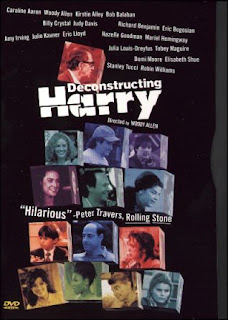Deconstructing Harry
 I was taking a look at the free offerings on my Comcast On Demand system and saw that Deconstructing Harry, Woody Allen's 1997 film, was available for viewing. I hadn't seen it since it was first released, so I took another look at it. When compared to the great Allen films, it comes up short, but in the long view it's an above-average example of his work, and in many ways was the last of its kind--Allen as the neurotic intellectual, struggling to make sense of life, the universe, and women.
I was taking a look at the free offerings on my Comcast On Demand system and saw that Deconstructing Harry, Woody Allen's 1997 film, was available for viewing. I hadn't seen it since it was first released, so I took another look at it. When compared to the great Allen films, it comes up short, but in the long view it's an above-average example of his work, and in many ways was the last of its kind--Allen as the neurotic intellectual, struggling to make sense of life, the universe, and women.The film mainly parrots the form of Bergman's Wild Strawberries, but as if written by Philip Roth. Allen is Harry Block, a novelist who is suspiciously similar to Roth, in that he is perceived as a self-hating Jew that writes scabrous fiction about sexual hostility. Allen is set to receive an honor at the college he was expelled from, but has no one to go with. He ends up with a prostitute and his nine-year-old son, whom he kidnaps, and sets out for upstate New York. Along the way he visits his sister, and also see flashbacks of his life, both as they really happened and as they appeared, thinly disguised, in his fiction.
The film is a bit jarring. It is edited with jump cuts--the opening scene, with Judy Davis getting out of a cab, keeps repeating as if the film were stuttering. Allen's closing lines explain this, as he says of his character that his life is disjointed, but for the most part this seems like an indulgent affectation. Also, the language is particularly caustic. I believe it was the first time that Allen's dialogue was full of vulgarisms. In that scene, Davis calls Allen a "motherfucker" repeatedly, and he calls her a "meshuggeneh cunt." It's like hearing your grandparents swear.
The film is also more overtly sexual than Allen usually is. In the first depiction of one of Block's stories, Julia Louis-Dreyfuss is on her knees miming oral sex to Richard Benjamin (a telling performance, given that Benjamin is probably best known as being an avatar of Roth in the film versions of Goodbye, Columbus and Portnoy's Complaint). Allen's character is also a lover of whores, and the character of Cookie (Hazelle Goodman), who eventually accompanies him on his trip, is dressed in trashy hooker garb. It is unfortunate that Allen, who rarely has black characters in his films, chooses to represent the race with such a caricature.
But that aside, this film is often funny, and scathingly so. For all of Allen's characters of this type, from Alvy Singer in Annie Hall to Isaac Davis in Manhattan to Micky Sachs in Hannah and Her Sisters, Harry Block is the most unabashedly honest. Many quirks are familiar, such as an antipathy to religion and a preference for science: "Between air conditioning and the Pope, I'll take air conditioning." In the scene with his sister (Caroline Aaron), and her orthodox husband (Eric Bogosian), Block pours out his disdain for religions, summing them up as clubs that teach people who to hate.
The film also takes aim at women. Most of them in this film, from Davis to Kirstie Alley as one of his ex-wives to Amy Irving as another, are shown as mean-spirited harpies. This could be chalked up to simple misogyny, but perhaps Allen is showing us how miserable his main character is. In a scene in which Alley, a psychologist, discovers Allen has been sleeping with one of her patients, he turns it around to suggest that he did that because her patients are the only women he meets.
The film's most inspired set-piece is his visit to Hell, where Billy Crystal rules. In the elevator down, we hear the floors called out: "Seventh floor--right-wing extremists, serial killers, lawyers who appear on television." The music is Benny Goodman's "Sing, Sing, Sing," and there's a certain pleasure in seeing the normally smarmy Crystal, a pale copy of old-style Catskills comedians, talking about how sleeping with blind women is great because "they're so grateful."
One thing about Allen's films--actors love to be in them, and this one has numerous cameos by big stars and those on the rise. Robin Williams, Demi Moore, Tobey Maguire, Elisabeth Shue, Stanley Tucci all appear. There are blink-and-you-miss them appearances by Paul Giamatti and Jennifer Garner. Allen has never wanted for star-wattage in his casts.
But Deconstructing Harry was really the end of an era. As seen by his output of the 2000s, it was his last fully successful comedy before the onslaught of films that appeared to be made from old scripts he dusted off, like Small-Time Crooks, The Curse of the Jade Scorpion, and Hollywood Ending. He has had a few good films since then, such as the drama Match Point and the more unusual, for him, Vicky Cristina Barcelona. But the days of him starring as the Woody Allen persona that has enlivened so many classic films are gone.


I saw this when it was released in cinemas; I respected it well enough and had some memorable bits (wasn't there a scene where Robin Williams had an 'out of focus' affliction') but found it a bit depressing and monotonous; despite its good qualities not a film I'd probably seek out again.
ReplyDelete